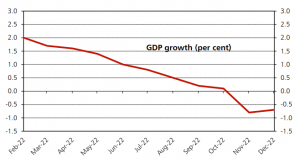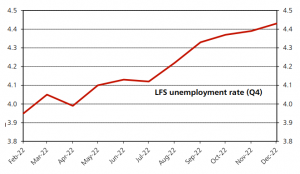
The UK economy shrank 0.3% in the three months ending September, stoking fears that the economy is entering a period of deep recession. The contraction in Q3 is more than the initial estimate of 0.2%. The national income estimates by the Office for National Statistics show that the Q3 GDP is 0.8% below its pre-pandemic level.
The economy is lagging behind other G7 countries with manufacturing and construction pulling down the headline growth figure. The economies of France (0.2%), Germany (0.4%) and Italy (0.5%) grew in September quarter. The services sector which accounts for around 80% of Britain’s GDP provided a silver lining with an expansion of 0.1% in the quarter. Business investment in the quarter was 2.5% lower compared with the same period last year.


All segments of the manufacturing sector shrank in the quarter and the disposable income of households contracted for the fourth straight quarter. The economy is expected to contract in the fourth quarter, which means the UK will enter a technical recession.
READ I Zero covid policy: China’s folly to haunt global economy
Missing workers dent UK economy prospects
Meanwhile, more than half a million working-age adults have left the British workforce after the outbreak of Covid 19 pandemic, posing a serious threat of weaker growth and persistently higher inflation. The sharp rise in economic inactivity is a serious challenge to the economy, said the House of Lords economic affairs committee.
Early retirement of 50-64 year olds due to the pandemic threat is the biggest contributor to a rise in economic inactivity. This is happening at a time when the economy is facing a severe manpower shortage. Economists have warned that the situation could lead to a deterioration in public services over recent years. Data from the Office for National Statistics also point to an increase in economic inactivity among people in the 50-65 age group.
The committee report says rising sickness rates among working-age adults, changes in the pattern of migration after Brexit, and an ageing population also contribute to the phenomenon of “missing workers”. Manpower shortages will dent economic prospects and reduce tax revenues available to fund public services, says the report, Where have all the workers gone?
The shortage in labour supply may add to inflationary pressure as employers will be left to woo lesser number of workers with fatter wages. The UK inflation has eased from 11% in October to 10.7% in November, but it is still above multi-decade highs. The wage growth in recent months rose to 6%, but it is still below annual inflation rate.
Chancellor Jeremy Hunt had warned that the UK economy will get worse before it makes a recovery. In November he had warned that the UK economy was already in recession. This will be confirmed when the GDP figures for the December quarter will be released in the new year. The Bank of England had said that the current downturn is the longest faced by the UK in recorded history.

